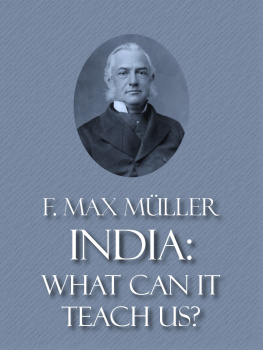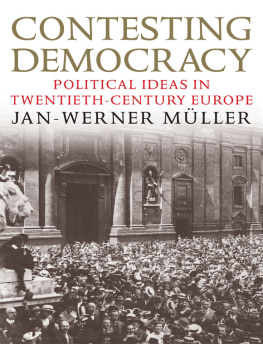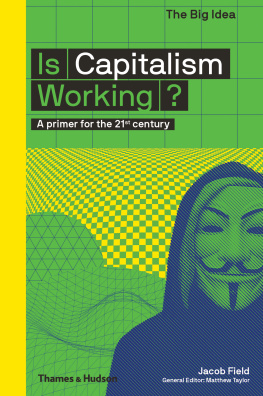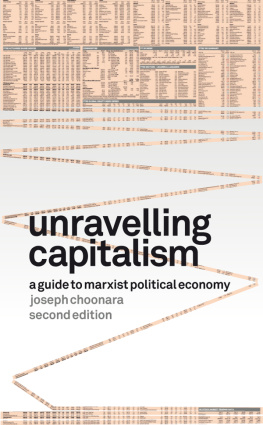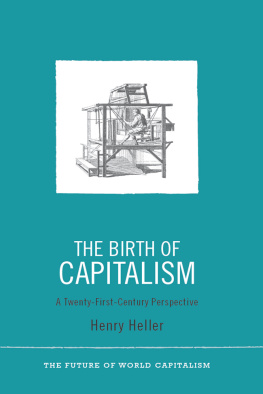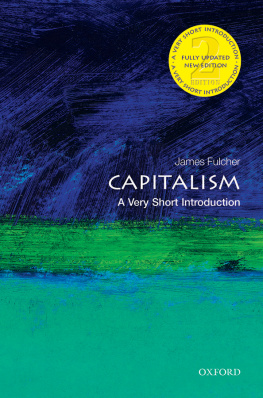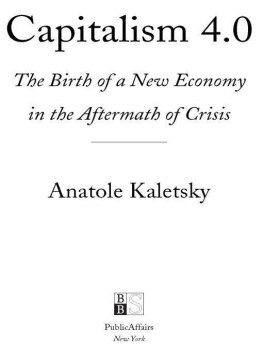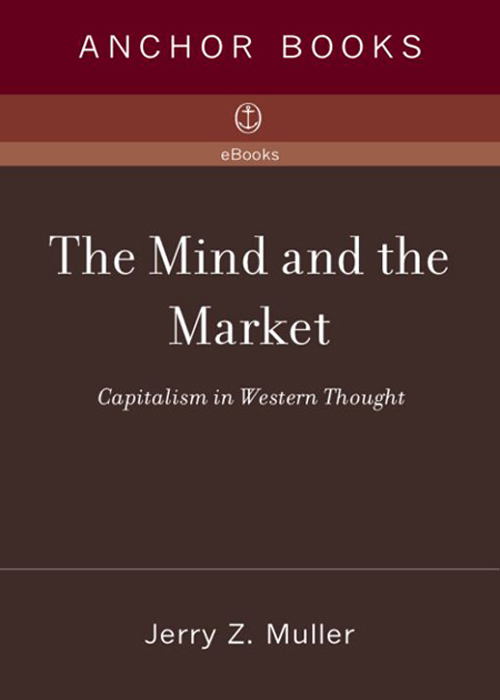
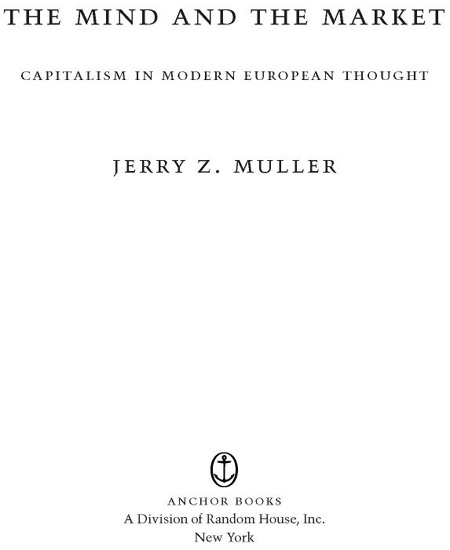
Contents
For my children,
Eli, Sara, and Seffy
INTRODUCTION
We live in a world shaped by capitalism. In one or another of its ever-changing forms, capitalism has been with us for three centuries, and it will be with us a long time yet. In twentieth-century Europe, communism and fascism both failed to provide viable alternatives, and their non-European analogues have not proved any more successful. As we try to think through capitalisms present dynamics and future implications, it may help to know the best that has been thought and said on the subject in the past. That is the premise of this book. It is based on the assumption that capitalism is too important and complex a subject to be left to economists. Achieving a critical comprehension of it requires perspectives beyond those characteristic of modern economics. That is why this is a history not of economic ideas, but of ideas about the capitalist economy. After Adam Smith, economics developed as a discipline in part through bracketing off many of the issues central to the thinkers treated here. That has certainly led to gains in analytic precision and in creating a shared disciplinary vocabulary. But in thinking about the market, as in much else, there is no free lunch: the gains in technique and disciplinary cohesion have come at the expense of marginalizing many of the issues about the market that are likely to concern reflective people.
The idea for this book arose in the mid-1980s. During the preceding decade, some of the most penetrating analysts of contemporary society had put the subject of the moral, cultural, and political ramifications of capitalism on the front burner of cultural commentary. Some of these commentators, such as Jrgen Habermas, were on the left; some, like Irving Kristol, were on the right; some, like Daniel Bell and Christopher Lasch, were in between. Their claims were many and diverse: that the familial hearth was being invaded by the forces of commerce; that civic virtue was disappearing; that the willingness to defer gratification upon which capitalism depends was in decline; that individualism and selfishness were destroying any sense of collective purpose; that work was losing its meaning; that men and women were besotted by consumer goods they did not need; that the international market was destroying particular historical cultures, leaving only a colorless syncretism or a hedonistic nihilism; that the spread of market values was eroding the very traditions and institutions on which capitalism depended; that the technological limits of growth had been reached; that the rich were getting richer while the poor were getting poorerthat for all these reasons and more, capitalism was in crisis.
Exploring modern European intellectual history under the stimulus of these present controversies, I found that such apprehensions had been on the minds of intellectuals for a very long time, at least since the eighteenth century. In fact, thinking about the ramifications of capitalism forms one of the great threads running through modern European intellectual history, as I first learned from radical intellectual historians on the anticapitalist left and right who had called attention to the fact. I therefore set out to recover and resuscitate what the best and brightest among European intellectualsthe great and the near greathave thought about the moral, cultural, and political ramifications of capitalism.
Though this is a book about European thinkers, it is not a book for Europeans alone. For while it places each thinker in historical context, it is concerned with arguments about the market that have a logic and validity not necessarily confined to the peculiarities of particular nations. Indeed several of the more recent thinkers wrote their most important works in the United States, not least because they thought that what was going on there had transnational ramifications.
The thinkers discussed in this book come from across western and central Europe, and from across the ideological spectrum. They include analysts who favored capitalism and those who despised it. In fact, as the book will demonstrate, the same analysis could be regarded as an argument for or against capitalism by thinkers who judged capitalism from differing moral premises. Since the evaluation of the moral significance of capitalism depends in no small part on the assessment of its economic effects, the book necessarily deals with what modern European intellectuals thought about how the capitalist economy functions and whom it benefits.
Among the issues that recur throughout this study is the question of poverty and wealth. Does the market make people richer or poorer? If it does tend to make people richer, is that necessarily a good thing? Ive been rich and Ive been poor. Believe me, rich is better, declares the heroine of Fritz Langs film The Big Heat (1953). But as we will see, the deeply entrenched traditions of classical republicanism and Christian asceticism claimed otherwise. In one way or another, a variety of modern thinkers from Rousseau through Marcuse have taken issue with the assumption that richer is better than poorer, arguing that material gain comes at the expense of moral loss.
Then there are questions of capitalism and culture. Does the market create a society more oriented to this-worldly rather than other-worldly concerns, and is that a point in its favor or against it? Is there a characteristic mentality associated with the market? If so, does that mentality spill over to other realms, and if it does, is that spillover desirable or lamentable?
What of the relation of the market to what we now call cultural pluralism? The term can be used in several distinct senses. Cultural pluralism may be said to exist on the international level when nations are culturally distinct from one another. Such difference between nations is compatible with enforced sameness within each nation, when a government tries to use its power to create or maintain a single, coherent national culture. Cultural pluralism exists in a second sense when there are a variety of ways of life within a single polity; such differences are compatible with enforced sameness within each community, which may try to use social, cultural, or other sanctions to keep individuals within the communitys cultural fold. Cultural pluralism can also be used in a third sense, on the personal level, to designate the development of individuals who combine in themselves elements drawn from a variety of cultures and traditions. Whether pluralism in each of these senses is fostered or destroyed by capitalism is an ongoing theme. As we will see, many of the issues regarding the threat to collective historical identity now discussed under the rubric of globalization have been on the minds of European intellectuals for well over two centuries.
How the market economy affects the family has been another long-standing focus among the analysts of capitalism. Whether the spread of market relations is conducive to the liberation of womenby exposing them to new commodities or to new vocational possibilities outside the homeis one such concern, one that has been evaluated differently by conservatives, liberals, and radicals. The effect of the market on fertility has also been a subject of ongoing reflection: under differing circumstances, both rising fertility and declining fertility have been interpreted as destructive of the social order.
The relationship between capitalism and equality is another recurrent theme. Does capitalism foster equality or create new inequalities? And whatever answer one gives, does greater equality or inequality matter? Does capitalism rely on equal contributions from all, or does it depend on successfully harnessing the talents and energies of extraordinary individuals? And might there be a tension between the emphasis on equality fostered by political democracy and successfully harnessing the creative and industrious to the capitalist engine?
Next page


